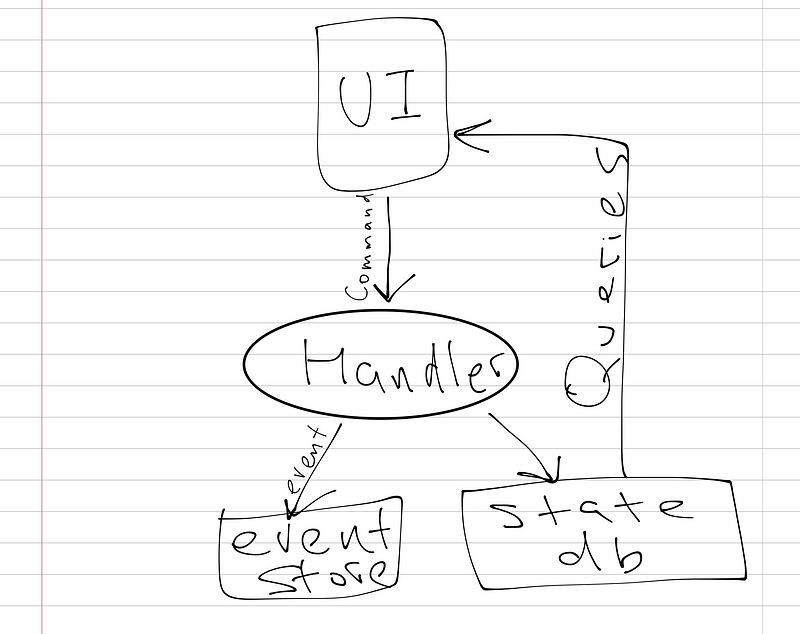A simple event sourcing library written in Scala.
E.S. is the idea of persisting immutable events of a domain object instead of its actual state:
Although you can save and get the last state into a database, you can also easily replay the events of the stream to get the state of your domain object.
There are a few problems with E.S., such as concurrency and side-effects while replaying your events. Styx can help you build your application using E.S., thus avoiding these common problems. ;)
The following example is based on: https://ookami86.github.io/event-sourcing-in-practice/
case class BankAccount(aggregationId: AggregationId) extends DynamicData with Stateobject BankAccountEventHander {
//you can always change the event store implementation, for instance:
// implicit val eventHandler: EventHander[BankAccount] = new CassandraEventHandlerFetcher[BankAccount]
implicit val eventHandler: EventHandler[BankAccount] with EventFetcher[BankAccount] = MongoDBEventHandlerFetcher(MongoD.collection, mapper, converter)
}case class BankAccountCreated(override val revision: Long, override val eventDate: Date = new Date()) extends Event[BankAccount](revision) {
def applyTo(account: BankAccount): BankAccount = {
val newAccount = BankAccount(revision, account.aggregationId)
newAccount.balance = 0
newAccount.id = this.id
newAccount.status = "ACTIVE"
newAccount.owner = this.owner
newAccount
}
override def canApply(state: BankAccount): Valid = validation(state.status == null, "this account is already created")
}case class DepositPerformed(override val revision: Long, override val eventDate: Date = new Date()) extends Event[BankAccount](revision) {
def applyTo(account: BankAccount): BankAccount = {
val newAccount = BankAccount(revision, account.aggregationId)
account copyTo newAccount
newAccount.balance = account.balance[Int] + this.amount[Int]
newAccount
}
}case class OwnerChanged(override val revision: Long, override val eventDate: Date = new Date()) extends Event[BankAccount](revision) {
def applyTo(account: BankAccount): BankAccount = {
val newAccount = BankAccount(revision, account.aggregationId)
account copyTo newAccount
newAccount.owner = this.newOwner
newAccount
}
}case class WithdrawalPerformed(override val revision: Long, override val eventDate: Date = new Date()) extends Event[BankAccount](revision) {
def applyTo(account: BankAccount): BankAccount = {
val newAccount = BankAccount(revision, account.aggregationId)
account copyTo newAccount
newAccount.balance = account.balance[Int] - this.amount[Int]
newAccount
}
override def canApply(state: BankAccount): Event.Valid = validation((state.balance[Int] - this.amount[Int]) >= 0,
s"the account cannot have a balance lower than zero. current balance: ${state.balance[Int]}, withdrawal amount: ${this.amount[Int]}")
}case class BankAccountClosed(override val revision: Long, override val eventDate: Date = new Date()) extends Event[BankAccount](revision) {
def applyTo(account: BankAccount): BankAccount = {
val newAccount = BankAccount(revision, account.aggregationId)
account copyTo newAccount
newAccount.closeReason = this.closeReason
newAccount.status = "CLOSED"
newAccount
}
override def canApply(state: BankAccount): Event.Valid = validation(!state.status.equals("CLOSED"), "this account is already closed")
}class CreateAccountCommand(implicit override val executionContext: ExecutionContext) extends Command[Request, BankAccount] {
override def event: EventProduce = (request) => (state) => {
Future {
val event = BankAccountCreated(state.lastEventVersion + 1)
event.id = request.id
event.owner = request.owner
event
}
}
override def execute: ExecutionProduce = (request) => (state) => Future.successful()
}class DepositCommand(implicit override val executionContext: ExecutionContext) extends Command[Request, BankAccount] {
override def event: EventProduce = (request) => (state) => {
Future {
val event = DepositPerformed(state.lastEventVersion + 1)
event.amount = request.amount
event
}
}
override def execute: ExecutionProduce = (request) => (state) => Future.successful()
}class ChangeOwnerCommand(implicit override val executionContext: ExecutionContext) extends Command[Request, BankAccount] {
override def execute: ExecutionProduce = (request) => (state) => Future.successful()
override def event: EventProduce = (request) => (state) => Future {
val event = OwnerChanged(state.lastEventVersion + 1)
event.newOwner = request.newOwner
event
}
}class WithdrawalCommand(implicit override val executionContext: ExecutionContext) extends Command[Request, BankAccount] {
override def event: EventProduce = (request) => (state) => {
Future {
val event = WithdrawalPerformed(state.lastEventVersion + 1)
event.amount = request.amount
event
}
}
override def execute: ExecutionProduce = (request) => (state) => Future.successful()
}class CloseCommand(implicit override val executionContext: ExecutionContext) extends Command[Request, BankAccount] {
override def event: EventProduce = (request) => (state) => {
Future {
val event = BankAccountClosed(state.lastEventVersion + 1)
event.closeReason = request.reason
event
}
}
override def execute: ExecutionProduce = (request) => (state) => Future.successful()
}object BankAccountCommands {
implicit val ec = ExecutionContext.fromExecutor(Executors.newFixedThreadPool(10))
val createAccount: ExecutionRequest[Request, BankAccount] = new CreateAccountCommand
val withdrawal: ExecutionRequest[Request, BankAccount] = new WithdrawalCommand
val deposit: ExecutionRequest[Request, BankAccount] = new DepositCommand
val changeOwner: ExecutionRequest[Request, BankAccount] = new ChangeOwnerCommand
val close: ExecutionRequest[Request, BankAccount] = new CloseCommand
}class EventSourcingTest extends FeatureSpec with Matchers {
feature("Creating an account") {
scenario("withdrawing more money than the balance has should throw an exception") {
implicit val ec = ExecutionContext.fromExecutor(Executors.newFixedThreadPool(3))
val aggregationId = UUID.randomUUID().toString
val result = List.range(0, 500).map { i =>
val eventualBankAccount = for {
account <- createAccount(Request("owner" -> "John Doe", "id" -> 123))(BankAccount(0, aggregationId))
account <- deposit(Request("amount" -> 20))(account)
account <- changeOwner(Request("newOwner" -> "Jane Doe"))(account)
account <- withdrawal(Request("amount" -> 10))(account)
account <- withdrawal(Request("amount" -> 10))(account)
account <- withdrawal(Request("amount" -> 10))(account)
account <- close(Request("reason" -> "Unavailable address"))(account)
} yield account
an[InvalidExecutionException] should be thrownBy Await.result(eventualBankAccount, 1000 millis)
val eventualSeq = Await.result(eventHandler.get(aggregationId), 1 minute)
val state = eventualSeq.play(BankAccount(0, aggregationId))
state.balance[Int] shouldBe 0
state.status[String] shouldNot be("CLOSED")
}
}
scenario("assert that replaying restores the actual state of the BankAccount object") {
implicit val ec = ExecutionContext.fromExecutor(Executors.newFixedThreadPool(20))
val result = List.range(0, 20).map { i =>
val aggregationId = UUID.randomUUID().toString
val eventualBankAccount = for {
account <- createAccount(Request("owner" -> "John Doe", "id" -> 123))(BankAccount(0, aggregationId))
account <- deposit(Request("amount" -> 20))(account)
account <- changeOwner(Request("newOwner" -> "Jane Doe"))(account)
account <- withdrawal(Request("amount" -> 10))(account)
account <- close(Request("reason" -> "Unavailable address"))(account)
} yield account
val result: Future[BankAccount] = eventualBankAccount.andThen {
case Success(state) => eventHandler.get(aggregationId).play(BankAccount(0, aggregationId))
}
eventualBankAccount -> result
}
result.foreach(f => {
val (eventualActualState, eventualPlayedState) = f
val playedState = Await.result(eventualPlayedState, 60 minutes)
val actualState = Await.result(eventualActualState, 60 minutes)
playedState shouldBe actualState
})
}
}
}
